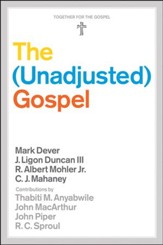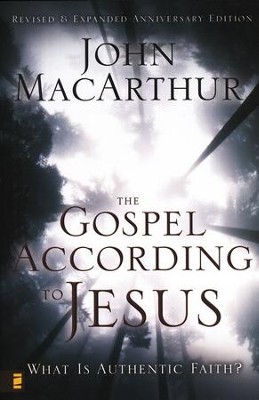Quotes about Gospel-Incorrect
Despite the obvious emphasis of Scripture (in regard to suffering), we are bombarded by suggestions that the “successful” Christian living takes place in the realm of constant victory, health, wholeness, and financial prosperity. In response to this we are not to pretend that suffering doesn’t exist or that it might be instantly cured. Such notions are the product of empty heads and closed Bibles.
Made For His Pleasure, Moody Press, 1996, p. 107. Get this book!
Any gospel which says only what you must do and never announces what Christ has done is no gospel at all.
Mind the Gap by Kevin DeYoung taken from The Hole in Our Holiness by Kevin DeYoung, copyright 2012, Crossway Books, a division of Good News Publishers, Wheaton Illinois 60187, www.crosswaybooks.org, p. 11.
Unless the Son of God died in our place, taking the punishment we deserve for our sins, we will not be saved, and we will not be citizens of His kingdom. Our guilt is too deep. If that is true, then we cannot soften the edges of the gospel message. We cannot move the penal, substitutionary death of Jesus to the side, we cannot replace it with any other truth, and we cannot reimagine it as something less offensive (and ultimately less wonderful!) than it really is. If we do, then we will present the world with something that is not saving, and that is therefore not good news at all.
The Gospel – God’s Self-Substitution for Sinners by Greg Gilbert, taken from Don’t Call it a Comeback, edited by Kevin DeYoung, copyright 2011, Crossway Books, a division of Good News Publishers, Wheaton Illinois 60187, www.crosswaybooks.org, page 81. Get this book!
The deader your gospel, the flashier your package.
If they had a social gospel in the days of the prodigal son, somebody would have given him a bed and a sandwich and he never would have gone home.
Today, the pressure to fill auditoriums and services has driven many pastors to place the felt needs, or tastes, of the people above their duty to Christ. On every hand we hear of the Gospel being molded into a non-confrontative message intended to meet felt needs and impress the sinful heart. And, by most standards, this new philosophy of church life is working, as more and more auditoriums are filled with people hungry for a message that will affirm that they are actually on fairly good terms with the Almighty. But the biblical message is the message of the cross. It cuts right across the grain of the modern age’s preoccupation with pride, tearing down the façade and exposing the wretchedness of the human heart… Unfortunately, while the modern “un-gospel” may fill seats, it is the true gospel of sin and grace that is “the power of God unto salvation” (Rom. 1:16).
Appointed to Preach, Christian Focus Publications, 1999, p. 46. Get this book!
[The prosperity gospel is] basically what the sixteenth century German monk turned church reformer Martin Luther called the “theology of glory”: How can I climb the ladder and attain the glory here and now that God has actually promised for us after a life of suffering? The contrast is the “theology of the cross”: the story of God’s merciful descent to us, at great personal cost, a message that the Apostle Paul acknowledged was offensive and “foolish to Greeks.”
[Their] message is also a good example of the inability of Boomers to mourn in the face of God’s judgment or dance under the liberating news of God’s saving mercy. In other words, all gravity is lost – both the gravity of our problem and of God’s amazing grace. According to this message, we are not helpless sinners – the ungodly – who need a one-sided divine rescue. (Americans, but especially we Boomers, don’t take bad news well.) Rather, we are good people who just need a little instruction and motivation.
So who needs Christ? At least, who needs Christ as “the Lamb of God who takes away the sin of the world” (Jn 1:29)? The sting of the law may be taken out of the message, but that only means that the gospel has become a less demanding, more encouraging law whose exhortations are only meant to make us happy, not to measure us against God’s holiness.
In fact, one would be hard-pressed to find anything in this message that would be offensive to a Unitarian, Buddhist, or cultural Christians who are used to a diet of gospel-as-American-Dream. Disney’s Jiminy Cricket expresses this sentiment: “If you wish upon a star, all your dreams will come true.”
If one’s greatest problem is loneliness, the good news is that Jesus is a reliable friend. If the big problem is anxiety, Jesus will calm us down. Jesus is the glue that holds our marriages and families together, gives us purpose for us to strive toward, wisdom for daily life. And there are half-truths in all of these pleas, but they never really bring hearers face to face with their real problem: that they stand naked and ashamed before a holy God and can only be acceptably clothed in His presence by being clothed, head to toe, in Christ’s righteousness.
It is appropriate that a prosperity gospel be born in the hedonistic, self-centered, get-rich-quick milieu of modern American society. We are, by nature, pagan. Either our religion will transform us or we will transform our religion to suit our sympathies.
It is to trivialize greatly the work of Christ to suggest that God the Father sent His only-begotten Son into the world to bear the world’s blasphemy, insults, and violence, and, most of all, to bear the Father’s wrath – all for increased cash flow and fewer bouts with asthma. It is to make a joke out of the great displeasure, anger, and wrath God has toward sin and sinful persons. God’s real problem, say the faith teachers, is not that we are wicked, selfish, God-hating rebels who deserve eternal punishment, but that we aren’t enjoying ourselves!
When we come to Jesus for salvation, we come to the One who is Lord over all. Any message omitting this truth cannot be called the gospel according to Jesus. It is a crippled message that presents a savior who is not Lord, a redeemer who does not demonstrate authority over sin, a weakened, sickly messiah who cannot command those he rescues.
The Gospel According to Jesus, © John MacArthur, 1988, p. 209-210. Get this book!
It is not the convicting work of the Holy Spirit that is drawing converts, but the allure of material possessions and the hope of physical healing.
The greedy materialism of the prosperity gospel turns the biblical gospel on its head. The true gospel is an offer of salvation from sin and spiritual death. The prosperity gospel ignores those eternal realities and falsely promises deliverance from temporal problems like financial poverty and physical sickness. Jesus called His disciples to abandon all, take up their crosses, and follow Him (Luke 9:23). By contrast, the prosperity gospel offers carnal comforts, earthly riches, and worldly success to millions of desperate people who literally buy into it. Whereas the true gospel centers on the glory of God, the prosperity gospel puts man’s wants and desires front and center.
The prosperity message unashamedly calls people to place their hope in the passing pleasures of this world. Rather than denouncing wrong desires, it glorifies worldly lifestyles, feeds on sinful greed, and makes poppycock promises to desperate people: “Get right with the Lord and He will give you a well-paid job, a nice house and a new car.” The prosperity gospel is more morally reprehensible than a Las Vegas casino because it masquerades as religion and comes in the name of Christ. But like the casinos, it attracts its victims with glitzy showmanship and the allure of instant riches. After devouring their last cent, like a spiritual slot machine, it sends them home worse off than when they came.
Strange Fire, Copyright © John MacArthur, 2013, p. 59.
Get this book!
We are His servants, not He ours. He has called us to live lives of loving service and worship, not godlike supremacy. He blesses us, but not always materially. In no way can we “write our own ticket” and expect Him to follow our script – nor should any real believer even desire such a scenario. The life of the Christian is a life spent in pursuit of God’s will – not a strategy to get Him to go along with ours. No one who rejects that fundamental truth can genuinely live unto God’s glory.
The message preached in some of the largest churches in the world has changed. A new gospel is being taught today. This new gospel is perplexing – it omits Jesus and neglects the cross. Instead of promising Christ, this gospel promises health and wealth, and offers advice such as: declare to yourself that everything that you touch will prosper, for, in the words of a leading prosperity gospel preacher, “There is a miracle in your mouth.” According to this new gospel, if believers repeat positive confessions, focus their thoughts, and generate enough faith, God will release blessings upon their lives (David Jones and Russel Woodbridge).
Taken from Health, Wealth and Happiness Copyright 2011, by David Jones and Russel Woodbridge, Published by Kregel Publications, Grand Rapids, MI. p. 14-15. Used by Permission. All Rights Reserved.
The nature of Christ’s salvation is woefully misrepresented by the present-day evangelist. He announces a Savior from hell rather than a Savior from sin. And that is why so many are fatally deceived, for there are multitudes who wish to escape the Lake of Fire who have no desire to be delivered from their carnality and worldliness.
We are all starved for the glory of God, not self. No one goes to the Grand Canyon to increase self-esteem. Why do we go? Because there is greater healing for the soul in beholding splendor than there is in beholding self. Indeed, what could be more ludicrous in a vast and glorious universe like this than a human being, on the speck called earth, standing in front of a mirror trying to find significance in his own self-image? It is a great sadness that this is the gospel of the modern world. The Christian Gospel is about “the glory of Christ,” not about me. And when it is—in some measure—about me, it is not about my being made much of by God, but about God mercifully enabling me to enjoy making much of Him forever.
You may spoil the Gospel by substitution. You have only to withdraw from the eyes of the sinner the grand object which the Bible proposes to faith, – Jesus Christ; and to substitute another object in His place… and the mischief is done. Substitute anything for Christ, and the Gospel is totally spoiled!… You may spoil the Gospel by addition. You have only to add to Christ, the grand object of faith, some other objects as equally worthy of honor, and the mischief is done. Add anything to Christ, and the Gospel ceases to be a pure Gospel!… You may spoil the Gospel by interposition. You have only to push something between Christ and the eye of the soul, to draw away the sinner’s attention from the Savior, and the mischief is done… You may spoil the Gospel by disproportion. You have only to attach an exaggerated importance to the secondary things of Christianity, and a diminished importance to the first things, and the mischief is done. Once alter the proportion of the parts of truth, and truth soon becomes downright error!… You may completely spoil the Gospel by confused and contradictory directions. Complicated and obscure statements about faith, baptism, Church privileges, and the benefits of the Lord’s Supper…are almost as bad as no statement at all.
[Flaws with] the so-called “prosperity gospel”: 1. They depend almost entirely on Old Testament promises of prosperity, which were spoken to the nation Israel and were not repeated in the New Testament to either Christian individuals or the Christian community. 2. They are insensitive to the poverty and hunger of many believers in developing nations, to whom the prosperity gospel does not apply. 3. They overlook the New Testament emphasis on adversity rather than prosperity as the chief mark of the followers of the Suffering Servant.
Today’s emphasis on packaging the gospel according to cultural demands doesn’t beautify truth but dresses up error.
















